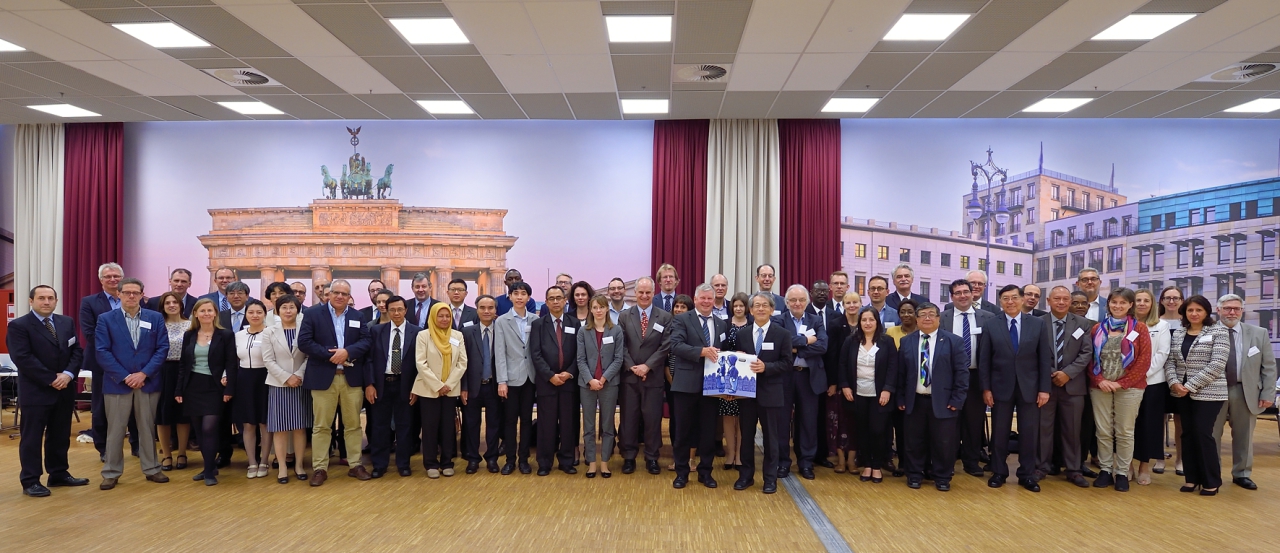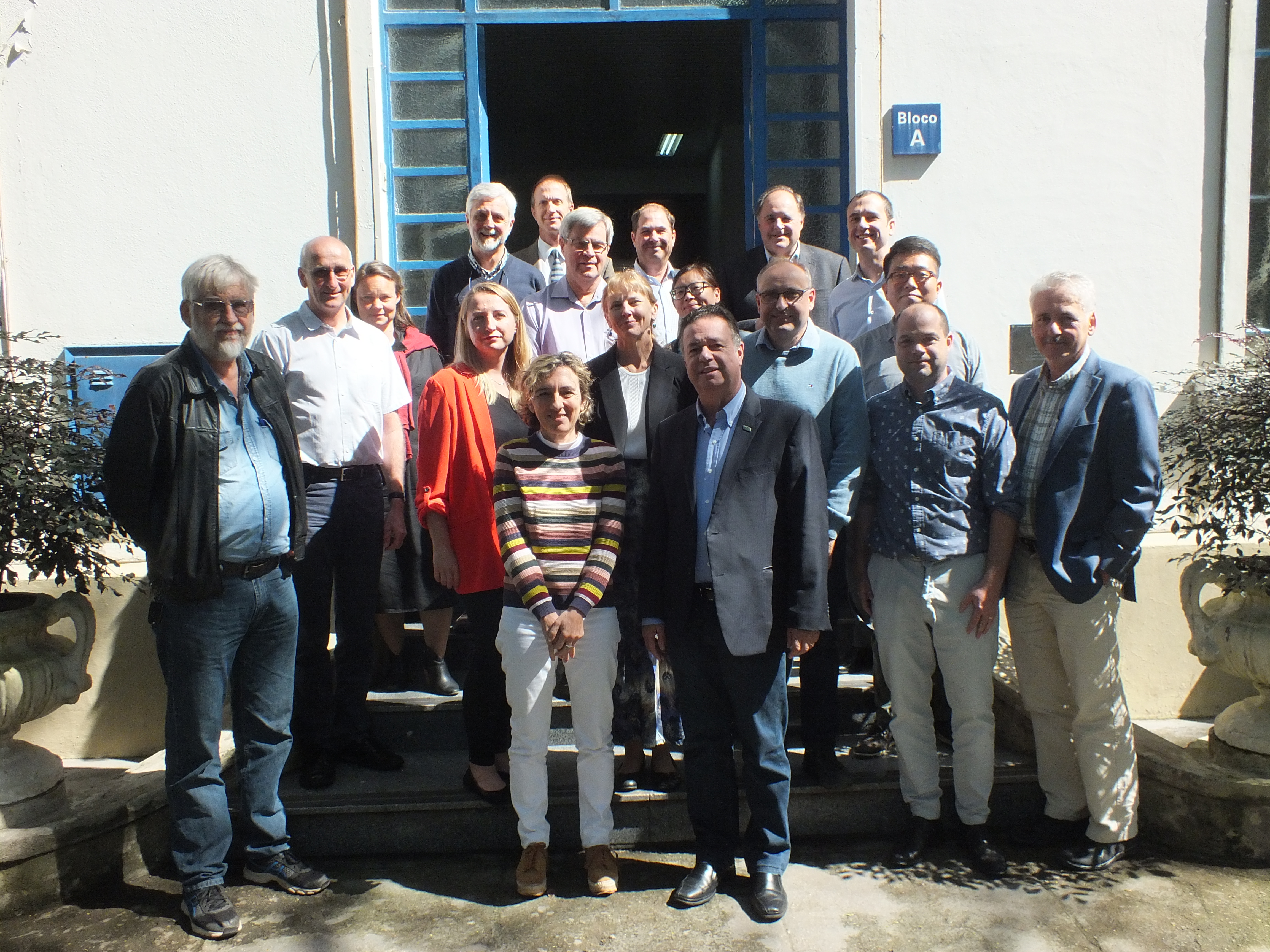The ‘International Conference on Agricultural Greenhouse Gas Emissions and Food Security – Connecting Research Policy & Practice’ focused on agricultural GHG emission reduction in light of climate change, sustainable agriculture, and food security. The conference was held on the 10-13th September 2018 in Berlin, Germany.
The conference outcome was summarised by:
- Hayden Montgomery (GRA Special Representative)
- Hartmut Stalb (Chair of FACCE – JPI)
- Bruce Campbell (CCAFS & CGIAR Representative); and
- Lini Wollenberg (Flagship Leader of Low Emissions Development at CCAFS (USA))
To learn more about the conference click here for the final summary slides.
Alternatively, click here to view the AgriGHG conference video and final report.
The Global Research Alliance on Agricultural Greenhouse Gases (GRA) is very pleased to welcome Mongolia as our 52nd Member country!
Mongolia has previously attended meetings of the Livestock Research Group, recognising the growing importance of the livestock sector. Membership in the GRA will help Mongolia increase research cooperation and investment into mitigation practices and technologies in order to develop more efficient and productive agricultural systems. This can also help to build the resilience of and adaptive capacity of these systems to help meet increasing demand for food in a sustainable manner.
The 52 member countries now participating in the activities of the Global Research Alliance are: Argentina, Australia, Belgium, Bolivia, Brazil, Canada, Chile, China, Colombia, Costa Rica, Democratic Republic of Congo, Denmark, Dominican Republic, Ecuador, Egypt, Finland, France, Germany, Ghana, Honduras, Indonesia, Ireland, Italy, Japan, Lithuania, Malaysia, Mexico, Mongolia, Namibia, Netherlands, New Zealand, Nicaragua, Norway, Panama, Paraguay, Peru, Philippines, Poland, Senegal, South Africa, South Korea, Spain, Sri Lanka, Sweden, Switzerland, Thailand, Tunisia, United Kingdom, United States of America, Uruguay, Vietnam, Zimbabwe.
For more information on the GRA or how to become a member country please contact the GRA Secretariat.
The CIRCASA project, to coordinate soil organic carbon research, are seeking stakeholder views on the role of Soil Organic Carbon (SOC) management for climate change mitigation and sustainable development.
If you are a farmer, landowner, public official, a non-profit organisation, private business, in academia, a member of civil society, a government authority, or dealing with soil organic carbon management in any other way, the CIRCASA project team would love to hear your opinions.
There are no ‘right’ or ‘wrong’ answers. The survey takes around 30 minutes to complete. It is available in seven languages. Your answers will be treated confidentially and anonymously. The data generated will be analysed to make comparisons across stakeholder groups and countries around the globe.
The results of the stakeholder survey will inform an international research agenda on SOC management. Such an agenda will strengthen coordination in global research on SOC management in agricultural soils, leading to improved understanding and scientific basis to target ambitious practices required to preserve and enhance SOC.
Follow the link below to contribute, the survey is open until 31 October 2018.
Announcement of a Joint Call on “Novel technologies, solutions and systems to reduce the greenhouse gas emissions in animal production systems”.
The Joint Call is a partnership between three European ERA-NET research initiatives on Sustainable Animal Production (SusAn), Monitoring and Mitigation of Greenhouse Gases from Agriculture and Silviculture (ERA-GAS) and Information and Communication Technologies and Robotics for Sustainable Agriculture (ICT-AGRI).
The Joint Call is supported by research partners from 24 countries, including from outside of Europe, participating countries are: Belgium, Chile, Denmark, Estonia, Finland, France, Germany, Greece, Ireland, Italy, Latvia, Lithuania, The Netherlands, New Zealand, Norway, Poland, Romania, Slovakia, Spain, Sweden, Turkey, UK and Uruguay.
The overall objective of the 2018 Joint Call is to contribute to the development of novel technologies, solutions and systems to reduce the GHG intensity of animal production systems (excluding aquaculture or fur animals) in Europe and beyond. This funding initiative calls for applied research. The projects’ potential impact should be relevant for the mitigation of GHG emissions within the coming 5 – 10 years. Deadline for proposal submission: 3rd December 2018
The call announcement and link to the online submission tool can be found on the FACCE-JPI website.
The 8th Symposium on Non-CO2 Greenhouse Gases (NCGG) is inviting proposals for paper presentations, workshops/interactive sessions or posters/exhibits.
The symposium will be held from June 12-14, 2019 in Amsterdam, the Netherlands. The subject of the conference is ‘Non-CO2 Greenhouse Gases, Global Challenges and Local Solutions’. The 4 themes of the symposium are:
- Global Challenges and Local Solutions;
- Sources, Sinks and Inventories;
- Atmospheric Processes; and
- Policy Implementation.
The deadline for Papers is December 1st, 2018. Please send your abstracts of 200-250 words in English to [email protected].
Download the Call for Papers here.
Click here for more about the event.
The Asia sub-group meeting of the Global Research Alliance (GRA) Paddy Rice Research Group (PRRG) will take place in Bangkok, Thailand on the 10-12th of October 2018.
This meeting will take place following the workshop “Rice Landscapes and Climate Change: Options for mitigation in rice-based agroecosystems and the scaling up of climate smart rice cultivation technologies in Asia”. This workshop is an activity of the Paddy Rice Research Group (PRRG) which aims to identify viable options for mitigation and adaptation in rice landscapes and develop scale-up strategies in support of national (NDC) targets.
Organisers of this workshop include the Global Research Alliance of Agricultural Greenhouse Gases (GRA), the Ministry of Agriculture, Forestry and Fisheries of Japan (MAFF) and Asia-Pacific Economic Cooperation (APEC).
Click here for more information about the workshop.
The eighth annual Council Meeting for the Global Research Alliance on Agricultural Greenhouse Gases (GRA) was held 10-11 September in Berlin, Germany. This meeting provided an exciting yet unique opportunity to cooperate and merge various initiatives in the context of sustainable agriculture, climate change, and food security. This meeting saw the handover of Council Chair from Japan to Germany and the acceptance of Indonesia as vice-Chair.
Key outcomes of this meeting included:
- acceptance of two new GRA Flagships, one on Circular Food Systems and the other on Nitrogen;
- agreement for the GRA to support the UNFCCC Koronivia joint work on agriculture; and
- the announcement of several upcoming capability building opportunities supported by the GRA and our partners
This year’s meeting was held alongside the International Conference on Agricultural GHG Emissions and Food Security – Connecting Research to Policy and Practice, jointly organized by the Global Research Alliance (GRA) and the Joint Programming Initiative on Agriculture, Food Security and Climate Change (FACCE-JPI) of the European Commission, in partnership with CGIAR-CCAFS. The conference was funded by the German Federal Ministry of Food and Agriculture and supported by its Federal Research Institute for Rural Areas, Forestry and Fisheries (Thünen Institute).
Representatives from 31 member countries that attended the meeting include Argentina, Australia, Brazil, Canada, China, Egypt, Finland, France, Germany, Ghana, Indonesia, Ireland, Japan, Lithuania, Netherlands, New Zealand, Norway, Paraguay, Senegal, Spain, Sri Lanka, Sweden, Switzerland, Thailand, Tunisia, United Kingdom, United States of America, Uruguay, Vietnam, and Zimbabwe. Kenya also attended the meeting as an Observer country.
Partner organisations who attended this meeting include the Centre for Research and Education in Tropical Agriculture (CATIE), Climate and Clean Air Coalition (CCAC), Consultative Group on International Agriculture Research (CGIAR), Climate Change, Agriculture and Food Security (CCAFS), International Centre for Tropical Agriculture (CIAT), Food Security, Agriculture and Climate Change – Joint Programming Initiative (FACCE-JPI), Regional Fund for Agricultural Technology (FONTAGRO), Food and Agriculture Organisation of the United Nations (FAO), International Soil Reference and Information Centre (ISRIC), World Agricultural Forum (WAF), World Farmers Organisation (WFO). The Nationally Appropriate Mitigation Action (NAMA-Facility) was also invited to present their work at the meeting.
At the eighth annual Council Meeting held in Berlin, Japan spoke about what they have achieved in their time as Council Chair before the hand-over to Germany.
Some of their achievements included hosting the 2017 Council meeting and Science conference, supporting research groups and flagships, lifting the profile of Alliance, strengthening relations with its partners, and expanding the membership of the Alliance during its chairmanship.
The statement from Japan on it’s achievements can be downloaded here.
This article offers an insight into the benefits of agroforestry and its potential to curb climate change.
The Global Research Alliance (GRA) is very pleased to welcome our 51st Member country, Namibia. Namibia is the eighth African country to join the Alliance.
Namibia recognises that membership in the Alliance can help the country achieve its climate change objectives and its Nationally Determined Contributions (NDC) targets, enshrined in the Paris Agreement.
The 51 member countries now participating in the activities of the Global Research Alliance are Argentina, Australia, Belgium, Bolivia, Brazil, Canada, Chile, China, Colombia, Costa Rica, Democratic Republic of Congo, Denmark, Dominican Republic, Ecuador, Egypt, Finland, France, Germany, Ghana, Honduras, Indonesia, Ireland, Italy, Japan, Lithuania, Malaysia, Mexico, Namibia, Netherlands, New Zealand, Nicaragua, Norway, Panama, Paraguay, Peru, Philippines, Poland, Senegal, South Africa, South Korea, Spain, Sri Lanka, Sweden, Switzerland, Thailand, Tunisia, United Kingdom, United States of America, Uruguay, Vietnam, Zimbabwe.
For more information on the GRA or how to become a member country please contact the GRA Secretariat.
The tenth meeting of the annual Croplands Research Group (CRG) of the Global Research Alliance on Agricultural Greenhouse Gases (“the Alliance”) was held at the Embrapa Soils Centre in Rio de Janeiro, Brazil. This meeting was held on 11th of August 2018, preceding the 21st World Congress of Soil Science. The Alliance meeting was chaired by USA (Dr Jane Johnson, USDA-ARS) and Brazil (Dr Ladislau Martin, Embrapa) as Co-Chairs of the Group.
This meeting was attended by 20 participants, representing 12 Alliance member countries and other invited experts. These alliance member attendees include: Argentina, Brazil, Canada, China, Denmark, Germany, New Zealand, Norway, Republic of Korea, Poland, Sweden, and USA.
Outcomes included reviewing and sharing member-country capacity building and research network activities, discussing research funding and meeting opportunities, and the identification of activities to support the Group’s Networks, and the Group’s alignment with, and understanding of the Alliance Flagships.
Presentations from the Croplands Research group (CRG) meeting can be found here.
Announcing an exciting new opportunity in the CCAFS’ Climate Food and Farming Research Network – Global Research Alliance Development Scholarship (CLIFF-GRADS) program. With support from USAID, we are offering CLIFF-GRADS scholarships for short-term scientific training and research stays on mitigation of greenhouse gas emissions from reduced food loss and waste. Visit the CCAFS website to learn more.
Background on CLIFF-GRADS: CLIFF-GRADS provides approximately US$10,000 for 3 to 6 month fellowships for graduate students from developing countries to work with a host research institution on projects related to quantification of agricultural GHGs and mitigation potentials. The grants can also be used for students already working with CCAFS or other host-institution researchers. Examples of recent awardees can be found here: https://globalresearchalliance.org/n/cliff-grads-awardees-2018/. A 2019 general call for quantification of GHGs in agricultural systems is already underway. The call described here is a new opportunity, focused on food loss and waste, for research to be conducted in 2019.
Opportunity: CCAFS will fund up to 10 developing country students with $10,000 each for research on the quantification of GHG mitigation in supply chains due to reduced FLW. The research must take place in 2019. Student applications are due by 30 September 2018 and students will be informed of decisions by 30 November 2018.


